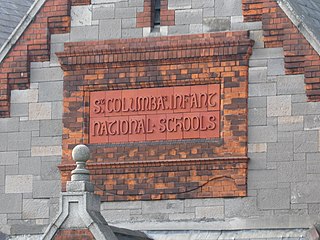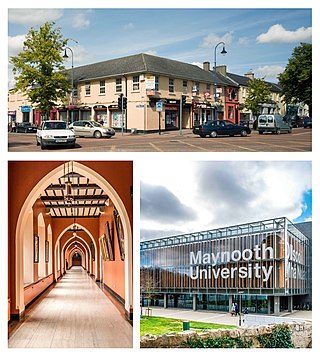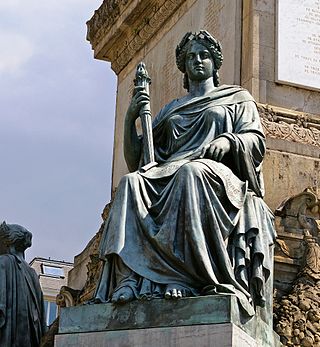
A multidenominational school (Irish : scoil ilchreidmheach) is a modern type of primary school in Ireland that moves away from the Catholic school model, which are common in Ireland (these also include Church of Ireland schools). [1] [2]

A multidenominational school (Irish : scoil ilchreidmheach) is a modern type of primary school in Ireland that moves away from the Catholic school model, which are common in Ireland (these also include Church of Ireland schools). [1] [2]
In secular usage, religious education is the teaching of a particular religion and its varied aspects: its beliefs, doctrines, rituals, customs, rites, and personal roles. In Western and secular culture, religious education implies a type of education which is largely separate from academia, and which (generally) regards religious belief as a fundamental tenet and operating modality, as well as a prerequisite for attendance.
The education system in Northern Ireland differs from elsewhere in the United Kingdom, but is similar to the Republic of Ireland in sharing in the development of the national school system and serving a similar society with a relatively rural population. A child's age on 1 July determines the point of entry into the relevant stage of education in the region, whereas the relevant date in England and Wales is 1 September.

Thomas Osborne Davis was an Irish writer; with Charles Gavan Duffy and John Blake Dillon, a founding editor of The Nation, the weekly organ of what came to be known as the Young Ireland movement. While embracing the common cause of a representative, national government for Ireland, Davis took issue with the nationalist leader Daniel O'Connell by arguing for the common ("mixed") education of Catholics and Protestants and by advocating for Irish as the national language.
Education in the Republic of Ireland is a primary, secondary and higher education. In recent years, further education has grown immensely, with 51% of working age adults having completed higher education by 2020. Growth in the economy since the 1960s has driven much of the change in the education system. For universities there are student service fees, which students are required to pay on registration, to cover examinations, insurance and registration costs.
Navan is the county town and largest town of County Meath, Ireland. It is at the confluence of the River Boyne and Blackwater, around 50 km northwest of Dublin. At the 2022 census, it had a population of 33,886, making it the ninth largest settlement in Ireland. The town is in a civil parish of the same name.

In the Republic of Ireland, a national school is a type of primary school that is financed directly by the state, but typically administered jointly by the state, a patron body, and local representatives. In national schools, most major policies, such as the curriculum and teacher salaries and conditions, are managed by the state through the Department of Education. Minor policies of the school are managed by local people, sometimes directed by a member of the clergy, as representative of the patron, through a local 'board of management'. Most primary schools in the Republic of Ireland fall into this category, which is a pre-independence concept.

Maynooth is a university town in north County Kildare, Ireland. It is home to Maynooth University and St Patrick's College, a Pontifical University and Ireland's sole Roman Catholic seminary. Maynooth is also the seat of the Irish Catholic Bishops' Conference and holds the headquarters of Ireland's largest development charity, Trócaire. Maynooth is located 24 kilometres west of central Dublin.

A Sunday school is an educational institution, usually Christian in character and intended for children or neophytes.

Ardee is a town and townland in County Louth, Ireland. It is located at the intersection of the N2, N52, and N33 roads. The town shows evidence of development from the thirteenth century onward but as a result of the continued development of the town since then much of the fabric of the medieval town has been removed. The town is in a civil parish of the same name.
Catholic schools are parochial pre-primary, primary and secondary educational institutions administered in association with the Catholic Church. As of 2011, the Catholic Church operates the world's largest religious, non-governmental school system. In 2016, the church supported 43,800 secondary schools and 95,200 primary schools. The schools include religious education alongside secular subjects in their curriculum.
Religious education is the term given to education concerned with religion. It may refer to education provided by a church or religious organization, for instruction in doctrine and faith, or for education in various aspects of religion, but without explicitly religious or moral aims, e.g. in a school or college. The term is often known as religious studies.

Freedom of education is the right for parents to have their children educated in accordance with their religious and other views, allowing groups to be able to educate children without being impeded by the nation state.

Firhouse is an outer suburb of Dublin, in the county of South Dublin, in the south of the traditional County Dublin in Ireland. It developed from a rural village by the River Dodder, with a second settlement, Upper Fir-house, nearby. It is just outside the M50 orbital motorway, and in the postal district of Dublin 24. It is adjacent to Knocklyon, Ballycullen, and Tallaght. In the historic divisions of local administration, Firhouse is in the civil parish of Tallaght and the barony of Uppercross.

Bettystown, previously known as Betaghstown and transliterated to Beattystown/Bettystown, is a village in County Meath, Ireland. Together with the neighbouring villages of Laytown, Mornington and Donacarney, it comprises the urban area of Laytown–Bettystown–Mornington–Donacarney with a combined population of 15,642 at the 2022 census. During the Celtic Tiger, with increasing property prices in Dublin, Bettystown expanded to cater for large numbers of commuters to Dublin. The area was well known before that as a spot for Dublin summer holiday visitors, with a number of caravan parks and seaside amusements.

Educate Together is an educational charity in Ireland which is the patron body to "equality-based, co-educational, child centred, and democratically run" schools. It was founded in 1984 to act as the patron body for the new multidenominational schools that opened after the establishment of the Dalkey School Project. As of 2024, Educate Together is the patron of 96 national schools in Ireland. In 2014 three Educate Together Second Level Schools opened in Dublin 15, Drogheda and Lucan along with the first Educate Together school outside Ireland, in Bristol in the United Kingdom. In joint patronage with Kildare and Wicklow ETB, Educate Together opened another second-level school, Celbridge Community School, in 2015.
The Dalkey School Project is a school in Glenageary, County Dublin in Ireland. It was set up on September 18, 1978 by parents in Dublin who wanted their children to attend a Multidenominational school.
Education in the Republic of Ireland is mostly denominational at primary and secondary level. That is to say, most schools are associated with a particular religion or Christian denomination. Denominational schools include most national schools at primary level, which types are publicly funded by the Department of Education. The school's patron or the chair of the board of management will often be a cleric or religious. The denomination influences the ethos, although in subjects other than religion a standard curriculum is prescribed by the Department of Education for all publicly funded schools. Denominational schools can give priority of admission to pupils of the given denomination with the exception of catholic schools but not refuse to admit pupils based on religion.
Florence "Florrie" Armstrong was an Irish teacher and pioneer of multi-denominational education in Ireland.
Coláiste Bhaile Chláir is an Irish co-educational and multidenominational community college situated in Lakeview, Claregalway, County Galway. It is under the patronage of the Galway and Roscommon Education and Training Board (GRETB).